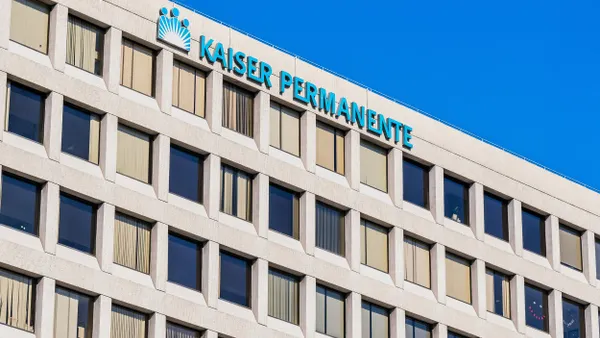Dive Brief:
- Community Health Systems brought in revenues that were in-line with company expectations during the third quarter, aided by a legal settlement, payer mix improvement and the approval of two new Medicaid state-directed payment programs.
- The Tennessee-based system reported $3.1 billion in operating revenue during the third quarter, down slightly year over year but still high enough to beat Wall Street’s expectations, according to an analyst note published by Jefferies on Friday.
- CHS said it plans to continue its hospital divestiture strategy. More sales are in the works and could close prior to year end, according to executives.
Dive Insight:
Overall, CHS grew same-store net revenue for the quarter by 6% year over year, with same-store inpatient admissions rising 1.3%.
CHS attributed its revenue growth to strengthening payer mix, especially in the commercial market, and the approval of Medicaid state supplemental payment programs in New Mexico and Tennessee. CHS also received a $28 million boost from an unspecified legal settlement in the quarter.
However, volumes also softened. Same-store surgeries declined by 2.2%, interim CFO Jason Johnson said on a Friday morning call with investors, and inpatient procedures were “mostly flat” year over year. Outpatient surgeries declined and emergency visits dipped 1.3%.
Some analysts have reservations about the operator’s long-term outlook due to its continued struggle to grow volumes.
“Our neutral stance on [CHS] is driven primarily by our concern that volumes have decelerated for the company (since Q2), particularly in its outpatient segment,” wrote Jefferies analyst Brian Tanquilut in a note Friday. “That said, we are encouraged by the positive trend in inpatient admissions in Q3 and improvement in outpatient clinic visits, but point to continued weakness in outpatient surgeries and ER visits — that we believe are being dragged by macroeconomic factors, specifically in [CHS’] geographies.”
Kevin Hammons, who stepped in as interim CEO and president this month after Tim Hingtgen retired, acknowledged some volume headwinds during the call with investors.
Ongoing immigration investigations at hospitals has cooled demand for services in Arizona and Texas. CHS first called out this operational risk last quarter, when the system lowered its adjusted admissions expectations for the year due to depressed volumes in Florida, Texas and Arizona.
“There’s still probably a little bit of an overhang there where … people are staying away from hospitals, at least on an elective basis, more than we’ve seen in the past,” Hammons said.
Still, Hammons said there are also tailwinds that could boost CHS’ performance at the end of the year, including the system’s planned divestitures and the possibility that more state supplemental payment programs could still be approved.
CHS has been aggressively pursuing hospital divestitures. This year, CHS has sold partial or full ownership interest in six of its hospitals. It announced its latest plan to sell three hospitals in Pennsylvania to Tenor Health Foundation on Friday.
Future sales are in the works, although executives were reluctant to share more details.
“We’re still pursuing some divestitures. We’re in some early conversations that ... we don’t know how far those will go, but certainly we’re continuing to get some inbound interest,” Hammons said. “We are in some more advanced discussions on a couple deals, which we think could be announced even later this year. But no agreements have been signed at this point.”
Hammons also used Friday’s call to provide an update on the health system’s strategic priorities. The interim CEO plans to hold a leadership conference with his new team next month to discuss the health system’s strategic vision, including how to achieve “sustainable positive free cash flow.”
That plan will prioritize investments in capital-efficient ambulatory care, according to Hammons. CHS will expand ambulatory access points in the coming years, including by investing in between six to eight ambulatory surgery centers next year.
CHS has already invested in capacity and service line expansions. During the quarter, CHS acquired a vascular surgery practice and opened urology, neurosurgery, spine and robotic surgery programs in multiple key markets.
CHS raised its full-year adjusted earnings before interest, taxes, depreciation and amortization outlook following the earnings release. The operator now expects between $1.5 billion to $1.55 billion in EBITDA for 2025, up from its previous guidance of $1.45 billion to $1.55 billion. The new outlook does not reflect any future potential divestitures from CHS or contributions from new or pending supplemental payment programs, according to Johnson.














